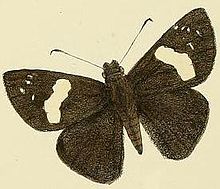Notocrypta feisthamelii, the spotted demon, is an Indomalayan butterfly belonging to the family Hesperiidae.[2] The name honours the French entomologist Joachim François Philibert Feisthamel.
| Spotted demon | |
|---|---|

| |

| |
| Scientific classification | |
| Domain: | Eukaryota |
| Kingdom: | Animalia |
| Phylum: | Arthropoda |
| Class: | Insecta |
| Order: | Lepidoptera |
| Family: | Hesperiidae |
| Genus: | Notocrypta |
| Species: | N. feisthamelii
|
| Binomial name | |
| Notocrypta feisthamelii | |

The named subspecies are [3][4][5]
- N. f. rectifasciata Leech West China
- N. f. alysos (Moore, [1866]) Himalaya to Burma, Thailand, Vietnam, Laos, Langkawi, Malaysia, Yunnan
- N. f. celebensis (Staudinger, 1889) Celebes
- N. f. avattana Fruhstorfer, 1911 Java
- N. f. samyutta Fruhstorfer, 1911 Lombok
- N. f. alinkara Fruhstorfer, 1911 Philippines (Mindanao)
- N. f. padhana Fruhstorfer, 1911 Batjan
The larva feeds on Costus, Maranta, Musa, Amomum, Curcuma, Elettaria, Hedychium, Zingiber.
References
edit- ^ Boisduval, 1832 Voyage de découvertes de l'Astrolabe exécuté par ordre du Roi, pendant les années 1826-1827-1828-1829, sous le commandément de M. J. Dumont d'Urville. Faune entomologique de l'Océan Pacifique, avec l'illustration des insectes nouveaux recueillis pendant le voyage. 1: 1-267, pl. 1-5
- ^ Vane-Wright, R. I., & R. de. Jong. 2003. The butterflies of Sulawesi: annotated checklist for a critical island fauna. Zoologische Verhandlingen 343: 1-267.
- ^ Seitz, A. ed. 1927 Die Großschmetterlinge der Erde, Verlag Alfred Kernen, Stuttgart Band 9: Abt. 2, Die exotischen Großschmetterlinge, Die indo-australischen Tagfalter, 1927, 1197 Seiten 177 Tafeln
- ^ Fruhstorfer, 1911 Neue Hesperiden des Indo-Malayischen Faunengebietes und Besprechung verwandter Formen Dtsch. Entomol. Z. Iris 25
- ^ Beccaloni, G., Scoble, M., Kitching, I., Simonsen, T., Robinson, G., Pitkin, B., Hine, A. & Lyal, C. (Editors). 2003. The Global Lepidoptera Names Index (LepIndex). World Wide Web electronic publication. http://www.nhm.ac.uk/our-science/data/lepindex/lepindex/ [accessed 2 November 2018]